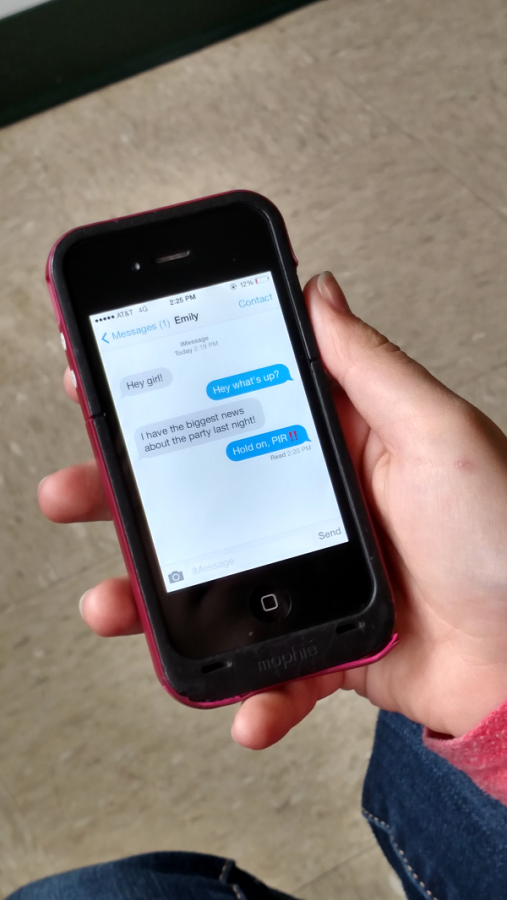A look at the Internet through teens’ eyes: misinterpretation
Recent news stories on the Internet have made it seem like teenagers have a whole secret text language to avoid adults’ scrutiny. But is this just another adult’s take on teenagers?
Everyone knows that feeling when they’re reading an article online about teens and nothing being written about is right. Who really is behind the writings on these articles? Adults.
Have you heard of the text abbreviations PIR? WYCM? TIME? SWYP? Yeah –many people don’t. What they do mean: parent in room, will you call me, tears in my eyes, so what’s your problem; these are just a few of the ridiculous abbreviations that teens are believed to use.
Most internet articles are written by adults – seeing that reliable sources like CNN and Time Magazine only hire adults. Are these sources really reliable in the sense of interpreting teens?
Sophomore Cailin Peters said, “No, because teens now are facing problems adults never had to deal with as kids like social media, internet, and school problems.”
“They base teens off of how they were when they were teens and not how they are now,” said Allison Closs, freshman.
Brittany Stephans stated, “It makes teens look worse than we really are; it puts out the wrong image of us.”
Adults like to take a chance and think the worst when it comes to what happens in their teens lives. But is it really ethical to judge teens by their societal cover?
Peters said, “The worse sides of teens are shown more than the good through the internet giving adults different misconceptions of teens today.”
“I think the internet sees teens as rebels without a cause,” said Closs.
Alize Niblack, junior, stated, “They don’t know what it’s like to be a teen using the internet in this generation.”
“They don’t know what teenagers are like these days; adults always think they know but they have no idea what they’re talking about,” said Stephans.
Overall, when you look at it teens do not believe that the internet is a reliable source into our lives. Most of us believe that we are wrongly interpreted on the internet because of the stereotypical teen image.
What do you think? Does the Internet portray teens fairly? Let us know in the comments below!
Want to help the Herd? Please consider supporting the Periscope program. Your donation will support the student journalists of CHS and allow us to purchase equipment, send students to workshops/camps, and cover our annual website hosting costs.

Brooklyn Norrell is currently a senior at Carlisle Area High School and this is her third year in Periscope. Brooklyn is the student life section editor...






























































































Destiny Billot • May 26, 2015 at 10:47 am
This article is crazy no one uses those texts anymore, I don’t even use those things, I like to write out everything.
Bailey Chambers • May 12, 2015 at 10:24 am
I completely agree with this. Adults like to criticize our generation, but they don’t really know what it’s like to be a young adult today.
Madeline Winn • Apr 27, 2015 at 12:43 pm
LOL IKR? I think that teens are capable of incredible things. There are plenty out there that are the stereotypical lazy and are abusing social media, but when you give teens a platform to succeed they usually go beyond expectations! I think that we as teens should take more initiative to show the world what we are capable of.
Seth Turnage • Apr 7, 2015 at 8:27 am
Personally i agree with all of the statements in this article. In my opinion many adults have a very skewed perception of what is actually going in teenagers’ lives because their attempting to apply their past knowledge of teenage life to problems that are affecting us now. For example, when they were growing up, social media was a completely nonexistent issue. Presently, it is a very real part of many students lives.
Taylor Lebo • Apr 7, 2015 at 8:22 am
I agree that most adults do view teens today as much worse than they actually are. This tends to happen because only the bad stuff gets spread around.
Megan Godfrey • Apr 7, 2015 at 8:21 am
I strongly agree with this article. Parents don’t seem to understand how times are different for a lot of teenagers now than what it was like when they were teens. Social media is our way of communication. Parents seem to over look the fact that it is the new generations way of staying in contact with each other.